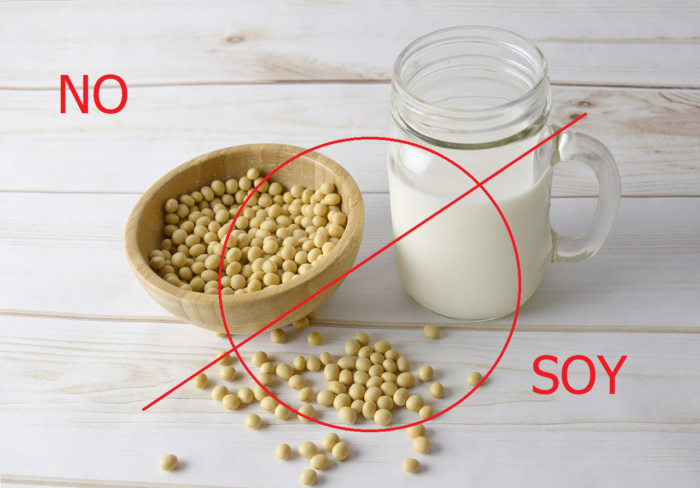Follow this link to learn more on the Dangerous Items list.
When the soybean was originally introduced into the United States around 1900, it was used in the manufacture of industrial products such as oil, plastic, and ink, but it was not considered fit to eat. Today, soy-based food products like hotdogs, sausage, bacon, cheese and frozen desserts abound in mainstream supermarkets and even in natural food stores. This soy invasion has been accompanied by a tremendous amount of soy-industry carnival ballyhoo regarding soy’s alleged health benefits.
The demonizing of traditional whole foods
The soy industry has shown remarkable ingenuity in overcoming consumer resistance to soy products, which were formerly perceived as tasteless poverty foods. The soy industry’s agenda: demonize whole foods such as butter, whole milk, meat, cream, cheese and eggs, and offer supposedly “high protein, low fat, no cholesterol” soy substitutes to the upscale consumer increasingly concerned about his health. We are talking of course about such now-familiar substitutes as soy milk for cow’s milk, soy baby formula, soy yogurt, soy ice cream, soy cheese, soy flour for baking and textured soy protein meat substitutes.
Specious health claims
As we noted, an extraordinary amount of hype and hoopla has accompanied the meteoric rise of soy as a desirable food. A popular booklet sold in many health food stores, for example, describes soy foods as “uniformly high in protein, but low in calories, carbohydrates and fats, entirely devoid of cholesterol, high in vitamins, easy to digest, tasty and wonderfully versatile in the kitchen.” Does this sound too good to be true? Yes? Well, that’s because it is.
Soy must be fermented
As we know, the soybean originated in ancient China. But it is important to note that the ancient Chinese did not eat unfermented soybean products. They recognized that soybeans were toxic, unlike the other legumes such as lentils, because the soybean contains large quantities of a number of harmful substances. First among them are potent enzyme inhibitors, which block the action of trypsin and other enzymes needed for protein digestion. These enzyme inhibitors are not completely deactivated during ordinary cooking and can produce serious gastric distress, reduced protein digestion and chronic deficiencies in amino acid uptake. Soybeans are also high in phytic acid or phytates. Scientists agree that the high phytate content of soy-based diets prevents the absorption of calcium, magnesium, iron and zinc present in foods. Moreover, soybeans contain hemoglutinen, a clot-promoting substance that causes red blood cells to clump together.
Tofu is not for you
Harmful substances such as enzyme inhibitors and and hemoglutinen are deactivated during the process of fermentation. Some examples of fermented soy products are: miso, tempeh, natto, and traditionally fermented soy sauce.
These products are safer to eat than tofu, however we know that Dr. Clark has not recommended any products made out of soy, including miso, tempeh, or natto.
It is important to note that tofu is not a fermented product. Sorry, tofu lovers! Vegetarians who consume tofu and bean curd as a substitute for meat and dairy products risk severe mineral deficiencies. The mineral that unfermented soy blocks the most is zinc. Zinc is called the intelligence mineral because it is needed for optimal development and function of the brain and nervous system.
What’s cooking in the gene kitchen
Soy is basically a monoculture requiring massive amounts of pesticides and herbicides. It is for this reason that the Monsanto Corporation developed a genetically-engineered strain of soy that is resistant to the herbicide Roundup. Proponents of GMOs (genetically modified organisms) confidently predict that within two decades, 75% of all our foods will come from genetically-engineered seeds, with soy foods at the top of the pyramid. The disastrous long-term effects of genetically engineered seeds on our ecology can only be guessed at, but this trend towards GMOs will continue to edge out the small farmer and will progressively centralize and industrialize our food production.
Allergies from soy
It is obvious that when our food supply is sprayed with pesticides, we end up eating it and suffering the consequences.
Mr. Graham, of York Nutritional Laboratory (March 1999), said researchers tested 4,500 people for allergic reactions to vegetables including soya. Among the range of chronic illnesses it caused were irritable bowel syndrome, digestiontion problems and skin complaints including acne and eczema. “People also suffered neurological problems with chronic fatigue syndrome, headaches and lethargy. It is worrying,” Mr Graham added.
The politics of soy
The soybean industry in America is highly monopolistic, controlled by a small number of huge companies like Cargill Corporation, and Archer, Daniels, Midland Company (ADM). ADM, the world’s major soy processor, yearly spends $4.7 million for advertising on Meet the Press and $4.3 million on Face the Nation. ADM also has holdings in major newspapers. They control the media, so naturally the press presents soy in a favorable light.
Buyer beware
In the Orient these soy-based foods are eaten in small amounts as condiments and not as a replacement for animal foods. Highly processed soy protein isolates and textured vegetable protein have little in common with traditional soy products. Tofu and soy milk are high in MSG. Bottom line: soy is big on hype and hoopla and small or worse than that on food value. Buyer beware!
Research in this article is fully referenced in Nourishing Traditions, by Sally Fallon Morell, New Trends Publishing, 2001; and Soy Allergies Up Along With GMOs Mark Townsend / Daily Express March 12, 1999.


